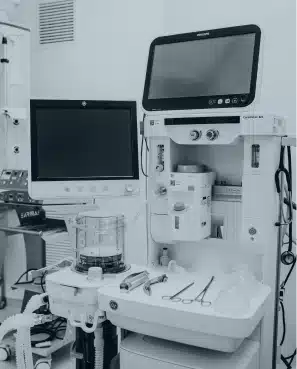C++ Application Development
C++ is a general-purpose programming language that is used to drive everything from the largest search engines to the smallest wearable tech on multiple platforms. Especially popular where computing resources are limited, it is capable of delivering efficient, reliable, and secure apps for connected devices and the IIoT.
What is C++ application development?
Using C++ for a project means adopting an established framework for developing back end code that delivers efficient, high performance, and an excellent choice for cross-platform applications. C++ powers apps for all sorts of devices in a variety of industries, from consumer-focused video games to industrial robotics, IoT devices and wearables, automotive and aerospace. Software development teams familiar with C++ keep complex applications safe from bugs and crashes, and secure data from external bad actors to power market-leading products across a myriad of domains.
The main challenges of C++ app development

No package manager
Unlike many other application development frameworks and programming languages, there is no standard C++ package manager or libraries to handle dependencies and implement them in an app code. As a result, it is not always straightforward and sometimes more effort for teams and engineers to adapt to C++ even with strong backgrounds in languages like JS, Ptyhon or Ruby.

staying up to date
C++ is regularly updated on a three-year cycle and being already a large, complex high-level language, it can be difficult for internal teams to stay up to date with the latest functionalities and features. Using outdated techniques for development can not only lead to a slower, less efficient app, but also one that’s less secure.

knowledge to use safely
Security is paramount in a connected device, particularly so in some of the critical industries that our clients regularly work in such as needed medical devices and industrial machines. Software engineers that are not at the cutting-edge of C++ programming can easily produce appls that are unsafe or insecure, increasing your exposure to financial and reputational risk.
Key elements to consider

Architect project
- Setup CMake
- Link different dependencies
- Employ Witekio templates

SUCCESS STORY
Develop an app using C++ for Philips
The Witekio team got to work developing custom code for everything, from low-level layers to advanced HMI, while managing the database, languages, and cloud connectivity for Philips’ connected coffee machines. With Philips’ ambitious end goals in mind and the need to develop not just one but four models for the product range, our team created a common source code using native C++ language. This approach simplified the evolution of system and web applications and optimized platforms maintenance.
How to develop cross platform apps using C++
Architect project
The first step to developing a cross platform C++ app is to map the requirements and gain an understanding of the various dependencies that will be required for that application.
Our engineers begin by setting up the project in CMake. CMake is a cross-platform tool that automates the building of a C++ application, compiles native code in libraries and generates scripts for other build automation tools. It allows the developer to create, build, compile, test, and package the final cross-platform app and is essential to the development project.
Our engineers then identify the relevant dependencies and map the means to link the different dependencies in the application. A dependency exists when one object invokes another’s to complete a specific task. Linking these allows the app to take full advantage of all that C++ offers.
To speed up the architecting process using C++, our developers employ Witekio templates that we have developed over many years for our development environment. These offer the benefits of speeding up the development process, adding value for clients and supercharging the creation of a new cross-platform C++ app.
Our engineers begin by setting up the project in CMake. CMake is a cross-platform tool that automates the building of a C++ application, compiles native code in libraries and generates scripts for other build automation tools. It allows the developer to create, build, compile, test, and package the final cross-platform app and is essential to the development project.
Our engineers then identify the relevant dependencies and map the means to link the different dependencies in the application. A dependency exists when one object invokes another’s to complete a specific task. Linking these allows the app to take full advantage of all that C++ offers.
To speed up the architecting process using C++, our developers employ Witekio templates that we have developed over many years for our development environment. These offer the benefits of speeding up the development process, adding value for clients and supercharging the creation of a new cross-platform C++ app.
Write application
With the project mapped and the app dependencies architected, it is time to move to the coding of the application itself using C++.
Our engineers code the app being sure to apply the latest C++ functionalities. Attention is paid to ensure that security and safety is paramount in the process of software development, removing the chance that an insecure application or a crash will generate a suboptimal end user experience.
The code written, our engineers then compile, test and validate the app to be sure that it works the way that it should, that there are no unwelcome surprises lurking in the code, and that the KPIs that you’ve set for the application and the user experience are met or exceeded.
Our teams then write the documentation that will allow your teams to manage, maintain, and explore the application. A complete and detailed documentation for the project makes it easier for teams to manage the application as built and determine in which direction to take the application next.
Finally, the handover to the team takes place. The code and the documentation are delivered to your product and engineering teams and any questions about the app, the code, the documentation, or the development process generally are answered as the project work is closed.
The code written, our engineers then compile, test and validate the app to be sure that it works the way that it should, that there are no unwelcome surprises lurking in the code, and that the KPIs that you’ve set for the application and the user experience are met or exceeded.
Our teams then write the documentation that will allow your teams to manage, maintain, and explore the application. A complete and detailed documentation for the project makes it easier for teams to manage the application as built and determine in which direction to take the application next.
Finally, the handover to the team takes place. The code and the documentation are delivered to your product and engineering teams and any questions about the app, the code, the documentation, or the development process generally are answered as the project work is closed.
Maintenance
Clients have the option of choosing a maintenance support package from Witekio that ensures that the app which our developers create is kept up to date and that any problems are resolved rapidly.
For those with a maintenance contract, the first step to resolving an issue is raising a problem. When bugs, memory leaks or other issues are flagged by the client our team kicks into gear and begins the process of addressing the issue as raised. Reporting can be by phone, email, or other means – the Witekio team is always available to support your project.
Our engineers then analyze the problem to determine why it has emerged, what impacts it is having on the code of the app and the end user experience and identify the best means to address the problem rapidly and effectively. With deep experience and long expertise in using C++ maintenance in many diffrent projects, our teams are the best equipped to handle any problem and optimize the app.
Finally, and in line with the service license agreement, all changes are pushed to the app by Witekio engineers to be sure that a fix is deployed within agreed timelines. Our engineers are used to moving fast and with your business interests in mind; speed and efficiency is always a priority in every project.
For those with a maintenance contract, the first step to resolving an issue is raising a problem. When bugs, memory leaks or other issues are flagged by the client our team kicks into gear and begins the process of addressing the issue as raised. Reporting can be by phone, email, or other means – the Witekio team is always available to support your project.
Our engineers then analyze the problem to determine why it has emerged, what impacts it is having on the code of the app and the end user experience and identify the best means to address the problem rapidly and effectively. With deep experience and long expertise in using C++ maintenance in many diffrent projects, our teams are the best equipped to handle any problem and optimize the app.
Finally, and in line with the service license agreement, all changes are pushed to the app by Witekio engineers to be sure that a fix is deployed within agreed timelines. Our engineers are used to moving fast and with your business interests in mind; speed and efficiency is always a priority in every project.
The main benefits of C++ application development
High performance applications
As C++ runs close to the machine you can expect high performance from your cross-platform apps. Memory demands are lower than alternatives, like Java, CPU use is more efficient, and you can do more with your device despite possibly greater hardware constraints. Today, software written with C++ powers apps on IoT and IIoT devices, video games, blockchain technologies and in business robotics as one example, proof of its capacity to perform at the highest levels for demanding end users in business and consumer markets alike.
Software doesn't dictate hardware
Software written with C++ doesn’t have high demands on the hardware which means that your software app isn’t going to dictate the hardware that you choose to use. Your product team can take advantage of running a C++ application to make hardware choices that take full advantage of its efficiency and small binary footprint. Low-power processors can be more than sufficient to deliver an excellent performance product for users, delivering value for customers and creating margin for product owners.
Regular updates, new concepts
The C++ language and framework is regularly updated on three year cycles. Each update delivers access to new concepts, features and functionalities that can improve an existing product and create added value for existing clients that are pushed OTA updates to their C++-powered devices. Our engineers remain up to date on all of these changes ensuring that your applications can take advantage of all that C++ offers to developers, external teams, product owners, and end users alike.
Witekio can support your C++ application development
Our engineers and developers have the skills, expertise, and experience to create and deliver your C++ application development projects. With a track record that includes cutting edge development for consumer and industrial devices, we can point to successful projects in a variety of domains and industries. Our teams stay up to date with the latest approaches to C++ programming and develop apps for multiple platforms with a security by design approach that mitigates the safety issues that might otherwise plague a C++ project. With Witekio you can rest assured that your application will meet your expectations for quality, speed, efficiency, and performance every time. Contact us and learn more about the benefits of using C++ for your project.
Our embedded applications expertise
